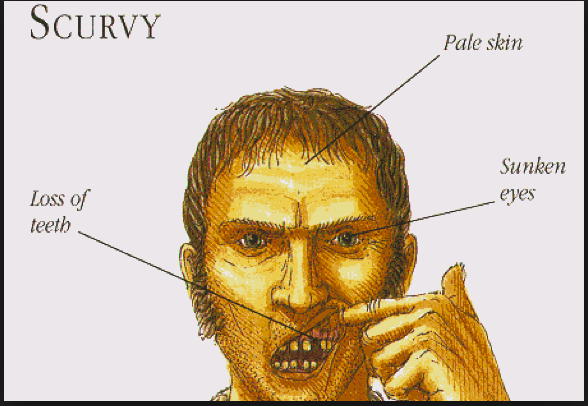
Yesterday in the late morning — after reading from a little book which had a small section on scurvy and how, from 1500 to 1800, scurvy killed as many as two million sailors, who on the high seas had limited access to fruit and Vitamin C — I was walking through the grocery store. I was on my way to the ibuprofen aisle (migraines), and there I passed by a seemingly unlimited supply of fruits and juices from around the world, all at very low cost.
I actually stopped in my tracks for a moment and considered this modern miracle, and the ramifications of it.
I thought of how the threat of scurvy, like polio, is one of thousands upon thousands of threats we now no longer think about, and I thought of Jeff Tucker’s article from some time ago about this same thing:
How at any time of the day or night, I can get on my computer or phone and search for the closest local store, get navigation, compare prices, discover nutritional properties, drive or motorcycle or bicycle there, and so on.
I thought of how I could even photograph it or shoot a video of it and share it immediately — and I thought of how none of this was possible even twenty years ago.
How we are in the middle of a quiet revolution which, for all its stealth, is happening far more rapidly than the revolution that made it possible: the Industrial Revolution.
Its quietness, I believe, is why there’s such a lack of consciousness about it. And most of what you hear about it are complaints: too much food, too much consumption, too much excess, too much obesity, evils of grocery stores and dire warnings that we’re ingesting disease-causing things.
Still, the fact remains: to the extent that humans are free, economic freedom is delivering miracles by the day, and hardly anyone seems to care or notice — or, worse, denounces it as dangerous, degenerate, decadent, when in reality it’s the realization of a beautiful dream that all our ancestors throughout history would not have believed possible.
Very recently, after receiving more anonymous, semi-hostile communications, this time from across the pond, concerning an article I wrote on food production — though, to be fair, I’ve also recently gotten some respectful communication from across the pond as well — the poorly reasoned content of the SPAM comments and email made me think of Mr. Tucker’s words anew:
We should all be more conscious of the cause-and-effect relationships operating in the world of human action, which give rise to the unbelievably elegant order of that thing called the free economy: an order, as he put it so well, “fueled by human choices, entrepreneurship, relentless learning, experimenting, imitating, copying, private property, and the freedom to trade; for these are the institutions bestowing miracles on us ever day. We also need to be aware of its opposite, the gargantuan apparatus of compulsion and coercion called the state that operates on principles that are anachronistic to the core. Its principle is violence, and its contributions to the social order are prisons, economic upheaval, and war. It is lumbering, stupid, and angry as hell, and it is the main drag on the world today. The contrast with laissez-faire is overwhelming. There is nothing that the state does that either needs to be done or cannot be done better within the matrix of voluntary action and exchange.”
Voluntary. Yes, let people choose. Even if that means they choose pizza with extra cheese and Taco Bell and Happy Meals, complete with Coke-a-Cola and a plastic straw — not my choice and perhaps not yours, but theirs.
It is, for the record — and this is largely to my latest correspondent(s) — the state and specifically FDR and the Agricultural Adjustment Act, which was part of the socialistic New Deal, the state and not the natural order of laissez faire, I say, which created government-sponsored farming and the horrible conditions that this thing fosters.
You want better farms, with cleaner, more diverse agriculture? Then get governments out of the farming business, which results in regulations that even supporters call “mind-numbingly complex.”
“Honestly, nobody sitting down today to create a new system would ever dream up such a complicated, convoluted and dual bureaucracy system that we’ve created now,” said Ferd Hoefner, the NSAC’s policy director.


Ray,
Glad to see you still maintain your stance on a free market. True capitalism is the only system that brings people up.
Hope to see you this week.
Mark Kendall